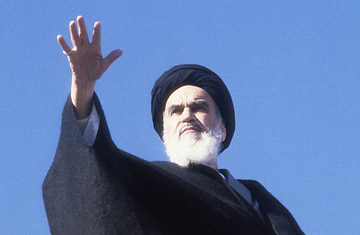
(4 of 8)
Iran's military was itself riddled with dissension. Some Shah loyalists among the top commanders undoubtedly favored a coup as the only way to keep Khomeini out of power. U.S. Air Force General Robert Huyser, the deputy commander of American forces in Europe, had been sent to Tehran a month ago to act as liaison officer with the Iranian military. He has forcefully argued that an army takeover would lead only to anarchy, but U.S. diplomats are uncertain as to whether the military is really listening. One deterrent to a coup is widespread evidence that many soldiers would not follow their officers in an uprising against the revolution. Low-paid conscripts, who make up about 40% of the 340,000-man Iranian military, have stopped reporting for duty in many areas.
The most frequent incidence of mutiny involves the air force, previously regarded as the favored elite service of the Shah. Military sources have denied rumors that 165 warrant officers were executed for taking part in anti-Shah demonstrations. They do admit that some soldiers have been arrested for treason and that a state of emergency has been declared for the armed services. During a show of force by the military the day before the Ayatullah's arrival, several truckloads of troops, some carrying Khomeini posters, waved sympathetically at the crowd. They burst into tears when other troops opened fire on the crowd, yelling at bystanders to get down or "the soldiers in back will shoot you." On Bloody Sunday, an ABC cameraman recorded an incident in which a soldier shot and wounded a colleague who was clubbing a youthful demonstrator with a rifle.
Many Iranians believed that the anti-Khomeini actions of the military were being directly inspired by the Shah, who last week remained in seclusion in Morocco with his family. There were rumors that he was planning a triumphant return to the throne, as he did after a CIA-inspired coup against the government of Premier Mohammed Mossadegh in 1953. Fears about the Shah's return were fueled by a curious tape recording, allegedly made by a participant at a secret meeting of the Shah and his top generals before he left the country. The 20-minute cassette, popularly dubbed "the braying of the Shah," was widely circulated in Iran, even though its authenticity was doubtful. Three independent American voice experts hired by CBS insisted that the voice on the recording was indeed the Shah's. A spokesman for the monarch, however, dismissed the tape as "typical Communist agitprop," and officials in Washington were convinced that the recording was a "cut and splice job."
The voice on the tape calls on the army commanders to foment civil war "so that we may hopefully begin again to recoup our power, being sure this time not to repeat our past mistakes." The speaker gives the generals "complete freedom to fire on the people and loll them" if necessary, to create hatred and dissension between the army and the people. The voice goes on to blame the inefficiency of SAVAK, Iran's feared secret police, for many of the current problems and vows that next time "we will set up a security apparatus more extensive than SAVAK."
